The Soul of Restaurants
10/31/2018What is it about our local dining establishments — or who is it — that make them special?
 Restaurants are so much a part of our lives that it’s hard to imagine a time without them. Yet they really have only been around for about two-and-a-half centuries. One school of thought is that they were an inadvertent byproduct of the French Revolution. So many cooks were unemployed after their masters were beheaded that they tried to
Restaurants are so much a part of our lives that it’s hard to imagine a time without them. Yet they really have only been around for about two-and-a-half centuries. One school of thought is that they were an inadvertent byproduct of the French Revolution. So many cooks were unemployed after their masters were beheaded that they tried to
make it on their own, pedaling on the streets until they built enough clientele to move indoors. They have been evolving ever since.
Restaurants are blessed

Mike Whalen, owner of the Johnny’s Italian Steakhouse and Machine Shed restaurants, says restaurants are blessed because they are where people choose to come and share the special occasions of their lives.
When Johnny’s Italian Steakhouse and Machine Shed owner Mike Whalen was president of the American Restaurant Association, he told a conference that the business was blessed because restaurants are where people choose to come and share the special occasions of their lives. Whalen was a “top of his class” graduate of Harvard Law School and spent a few years in private practice in Los Angeles before he discovered that a happy life was probably not what he would realize in Beverly Hills. He moved to Davenport and opened the first Machine Shed, then called Iowa Machine Shed. He’s obviously never regretted that.
People expected to see him
What is it about restaurants that make them special? Most people associate restaurants with owners and executive chefs. In the middle of the last century, most restaurants were owned by people who also ran them and were nearly always present, making customers feel good that they chose to visit. Babe Bisignano famously closed Babe’s rather than allowing it to go on after his health made it impossible for him to be on the floor every night greeting his guests. His explanation? People expected to see him, and it would be wrong to disappoint them from the moment they walked in.

The late Babe Bisignano, owner of Babe’s, believed his customers expected to see him, and it would be wrong to disappoint them.
There are still places in town that operate on this old-school principle. George Formaro tries to show up every day at each of his restaurants — Centro, Malo, Django, Zombie Burger and Gateway Market Café — and works a full shift at one or another several times a week. Owners are usually present at Tursi’s Latin King, Christopher’s, Noah’s, Aposto, Jesse’s Embers, Lucca, La Mie, B&B Grocery, Meat and Deli, Maccabee’s Deli, Trostel’s Greenbriar, Alba, Hoq, Hilltop, Flying Mango, Irina’s, Bubba and several others. Most of those places have Italian owners, which is probably the most traditional type of restaurant in town. Vietnamese cafés like Pho All Seasons and 515 operate on the same personal ethic. Those places amount to a small percentage of the 500-plus restaurants in the metro.
Stars of hospitality
For the most part, customers have never met the owner of the places they frequent. One’s experience is dependent on the kindness and professionalism of employees. Aware of this, the Iowa Restaurant Association began recognizing people who have worked, often behind the scenes, in restaurants for 20-plus years. Stars of Hospitality Awards went last year to seven restaurants with multiple employees who fit that description. In metro Des Moines, Virginia Hayes, Marianne Holland, Ned Johnson, Michael R. LaValle, Kristy Maras, Teresa Vroman-Munoz, Joseph Trieu Nguyen, Siphay Sithiphong, Darrel Stanley and Imre Torok of Des Moines Embassy Club and Sheree May and Deanne Plew of Trostel’s Greenbriar in Johnston were honored. Also winning these awards were employees of the Northwestern Steakhouse in Mason City, Flapjacks in Maquoketa, Pizza King in Council Bluffs, Ox Yoke Inn in the Amanas, and the Hotel Julien in Dubuque.
Dependent on employees
Most restaurant experiences today are interactions with waiters and bartenders. The quality of what appears on your plates depends on specialists in mise en place, sauté, sauces and soups, grilling and broiler cooking, and baking. There is rarely an owner directing things in the kitchen. Because restaurants are so dependent on employees, kitchen jobs tend to be career jobs more than they used to. Waiting tables and bartending are no longer jobs one does while waiting to graduate or to find one’s calling.
Formaro says he knows few places in town today that only pay dishwashers minimum wage, or anything close to it.
“Across the board, competition for good help is so intense that the difference in income between the front and back of the house is evening out, including the tips that waiters and bartenders make.”
 “Remember that staff shortages happen. People call in sick too late to find replacements. If you are dining in a room with two waiters that should have three or four, remember it’s not the waiters’ fault. Be patient. Personally, when I notice this, I tell my waiter not to worry about me. I will not be that person who bitches about a water glass not being refilled fast enough. And I won’t go to a social media site to complain about it.”
“Remember that staff shortages happen. People call in sick too late to find replacements. If you are dining in a room with two waiters that should have three or four, remember it’s not the waiters’ fault. Be patient. Personally, when I notice this, I tell my waiter not to worry about me. I will not be that person who bitches about a water glass not being refilled fast enough. And I won’t go to a social media site to complain about it.”
— George Formaro, owner of Centro, Malo, Django,
Zombie Burger and Gateway Market Café
Emergencies and rush hours
A culinary college graduate, Formaro also thinks all owners and executive chefs need to have a background in every job in the restaurant.
“I bussed tables, washed dishes and did every job in the kitchen. As an owner, you will inevitably have to do all those jobs again because people call in sick or just don’t show up. You don’t learn how to cope with emergencies and rush hours in college,” he said.
A lot of culinary school graduates today think they are ready for executive chef jobs right out of school. Some think they are ready for the Food Channel. Restaurateurs prefer employees who have worked several kitchen positions.
“Kitchen jobs are all different. Some superb prep cooks are no good on the line. Salad station and soup and sauce jobs are sophisticated, but they aren’t stressful. Mostly you follow recipes. At rush hour, it’s an adrenaline job, for muscle men with skills. This is where the action is. It’s not easy to get a perfect sear on a scallop or a steak. College does not prepare you for the push of rush hour,” he told us.
The Peter Principle says that people who excel at one job will be promoted until they reach a position beyond their competence. Is this true in the kitchen?
“Yes and no. If you are good at a position, you will always be welcomed up. But some people don’t have the temper for some jobs. Not all great cooks are great chefs. Many people think they want to be executive chefs, but today they find that means lots of computer and paper work. They miss the line,” Formaro explained.
Most local chefs and owners complain about labor shortages. How is this playing out?
“Wages have skyrocketed. I know that the Iowa City/Cedar Rapids corridor has severe staffing problems, but I really worry about restaurants in small towns. Some of those great places will struggle unless they have family willing to work in the restaurant,” he said.
Does Formaro have any advice to diners?
“Remember that staff shortages happen. People call in sick too late to find replacements. If you are dining in a room with two waiters that should have three or four, remember it’s not the waiters’ fault. Be patient. Personally, when I notice this, I tell my waiter not to worry about me. I will not be that person who bitches about a water glass not being refilled fast enough. And I won’t go to a social media site to complain about it,” he said.
A waitressing and bartending career
One of those longtime employees the Iowa Restaurant Association wants to spotlight is Monna Greer. She’s been at Jesse’s Embers for 33 years and worked at Tursi’s Latin King, Dominic’s, Christopher’s and The Office, among others. How did she happen to make waitressing and bartending a career rather than a job?
“I worked a day job for Crescent Chevrolet and night jobs at restaurants for years. Then the dealership closed. Thirty-three years ago, I had just adopted a daughter, and I desperately needed a day job. Embers needed a day bartender, so that’s how I got there.”
Greer raised her daughter as a single mom.
“Those were different times. Back then single people couldn’t go to an adoption agency. I adopted from the state. My daughter was 10 then and came from Orchard Place. She had been removed from her birth mom’s custody. Today, she’s got a good job at Wells Fargo and a degree in criminology. I am so proud of her,” she said, adding that today she lives with two dogs and two giant rubber trees from her mother’s grave.
Did she always want to work in the hospitality business?
“My first real job was at JC Penney’s when I was 16. Then I worked in insurance and quickly discovered that wasn’t me. Restaurants were. I love the interaction with people,” she said.
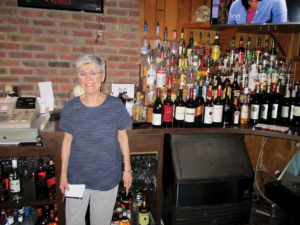 “Waiting tables. It allows for more interaction with customers. I worked for Dom Colosimo at Dominic’s for eight years beginning in 1969. That’s where I learned everything I know, including that I loved the business.”
“Waiting tables. It allows for more interaction with customers. I worked for Dom Colosimo at Dominic’s for eight years beginning in 1969. That’s where I learned everything I know, including that I loved the business.”
— Monna Greer, Jesse’s Embers employee
Does she prefer waiting tables or bartending?
“Waiting tables. It allows for more interaction with customers. I worked for Dom Colosimo at Dominic’s for eight years beginning in 1969. That’s where I learned everything I know, including that I loved the business,” she said.
What changes has she seen in the business over the decades?
“Wine is the most different. When I started, there were three choices — red, white and rose. The Ember’s used to have them in kegs. Now they are far more sophisticated. I am the wine buyer for Ember’s (she is also the title clerk and writes the daily reports), and I love that part of the job. I order two cases a week of one wine — Martin Ray Pinot Noir. We sell a lot more bottles now, especially after the state passed a new law that allows a customer to take his leftover wine home.
“One thing has come full circle. When I started in the business, Rosé was the most popular wine. Mateus was the big thing. Rosés are coming back again now,” she said.
Greer also says that far more people have special dietary requests now, especially for gluten-free.
“The menu asks people to please make servers aware of these. They serve some steaks on a piece of bread unless you ask for gluten-free treatment,” she said.
Recalling that, when she started waiting tables, the wage was 67 cents an hour, Greer said that has gone up to $4.35. Standard tips were 5 to 10 percent when she started and now average about 18 percent. “Some people still think it’s 5 percent, though,” she laughed.
She also mentioned that the all-afternoon lunch is gone.
“Used to be guys would come in for lunch and drink right through happy hour. Now we are dead from 2-4 p.m. Today, the average customer is older than he used to be. Not as many young people come as 30 years ago. If they do, they are usually the children of longtime customers,” she said.
Another change is that baked potatoes share the spotlight now. They are still the most popular choice with steaks, but cottage fries are catching up. One thing she says has not changed.
“About 90 percent always order the same drink. Vodka and gin are more popular compared to whiskies now, though.”
The funnier things she’s seen in the restaurant? She rattles off several.
“I remember one night a lady waiting for a table walked right up to a couple who were eating and asked them to leave. They ignored her. There’s one guy who has quit drinking for years, and he always sits at the bar and orders a drink. I refuse to serve him, and someone else will usually offer to buy him a drink. I still think it’s wild how many people will call for a reservation. Ember’s has never taken a reservation. It’s too small (12 tables) to hold a table when people are waiting for one,” she said.
Any question about this employee being a face of the business was dispelled when we met at a coffee shop for this interview.
“Everywhere I go, somebody usually knows me. There is one couple who always stop in from Chicago when visiting their son at Drake. They call to ask when I am working. That’s something you don’t get working in most businesses,” she explained.
She believes that a waitress earns her tips.
“I remember making 67 cents an hour. Too many young kids think tips are an entitlement. Every year I have a Christmas party at my house for customers. I think you have to give back,” she said, adding that she makes everything herself, except for lasagna, which she insists must come from Tursi’s Latin King. “Their chef, Pat Morris, is awesome. He’s been there 35 years,” she said.
When we met for this interview, Greer was wearing a George Strait sweatshirt. She said she’s seen every show he ever did in Des Moines and has also seen him in Vegas and Nashville.
“He’s genuine and generous. I like advertising for him.”
Sounds a lot like the afternoon bartender at Jesse’s Embers. ♦
Iowa Restaurant Association STARS OF HOSPITALITY
People who have made a career in the restaurant industry by working at a single establishment and/or for a company for 20-plus consecutive years.
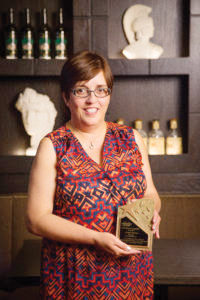
Angie Brown – Superstar of Hospitality 40+ Years Pizza King, Council Bluffs
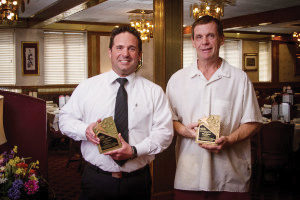
Vasili Fountas and Steve Bartelt Pizza King, Council Bluffs

Bobby Edminster, Vickie Donar, Ron Helbling and Annette Jones Hotel Julien, Dubuque
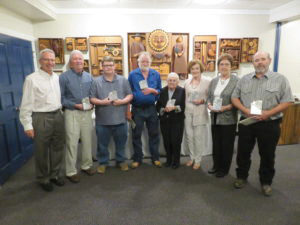
Ron Goltz, Vince Hartz, Doug Metz, Barbara Schulte, Sharon Peters, Suzanne Gramblin and Steve Heishman Ox Yoke Inn, Amana Colonies
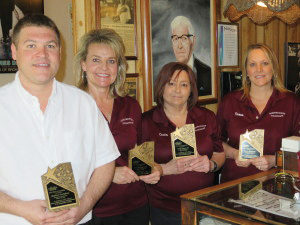
Matthew Rumeliote, Pam Bartholomew, Cindy Papouchis and Donna Meacham Northwestern Steakhouse, Mason City
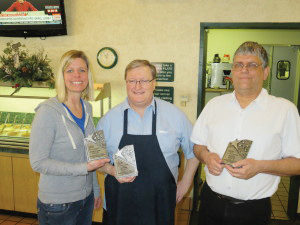
Tom Peiffer, Mike Lietz and Shelbe Krogman Flapjacks Restaurant, Maquoketa

Virginia Hayes, Marianne Holland, Ned Johnson, Michael R. LaValle, Kristy Maras, Teresa Vroman-Munoz, Joseph Trieu Nguyen, Siphay Sithiphong, Darrel Stanley, and Imre Torok Des Moines Embassy Club, Des Moines
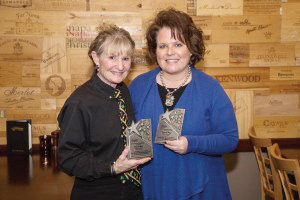
Sheree May and Deanne Plew Trostel’s Greenbriar, Johnston





















My wife and I had gone a couple of times to Jesse’s and we were served by Monna. She is an awesome waitress. She has a fantastic memory and keeps a close eye on your needs. You don’t see her kind of restaurant staff anymore.